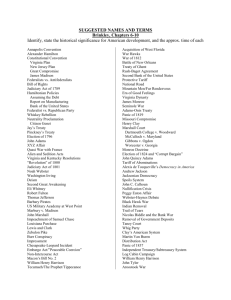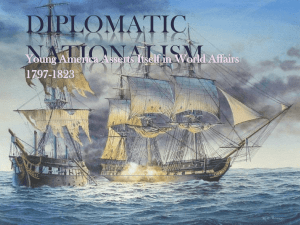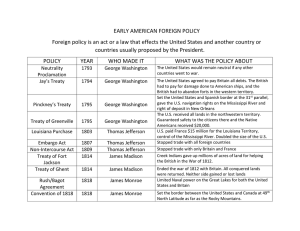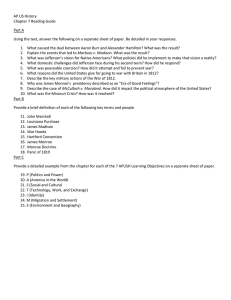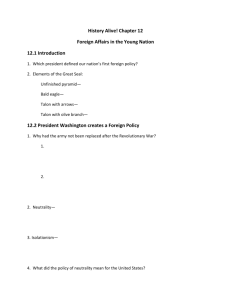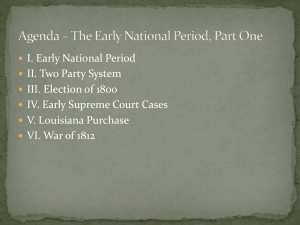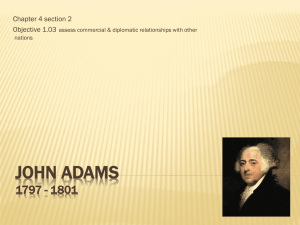Document 15573155
advertisement
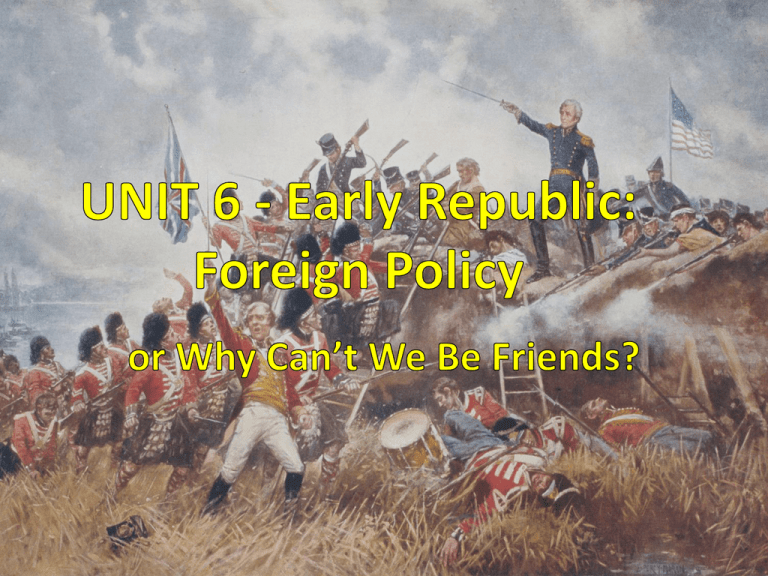
The new republic had to deal with neighbors: • Spain to the West and South • Britain to the North – still hadn’t left Northwest Territory … and conflicts in Europe with its French allies Lack of money and fear of tyranny had prevented building a national military OK, Cabinet – check Courts – check Military – umm … well, at least we have militia - that’ll have to do for now North America in 1789 Unit 6 BIG IDEAS 1. The early republic presidents tried to pursue a policy of neutrality and isolationism in foreign affairs. 2. Conflicts with foreign nations made these policies difficult to maintain. 3. The War of 1812, while fought to a draw, resulted in a stronger and more united U.S. 4. The Monroe Doctrine established the U.S. as protector of the Americas when former Latin American colonies gained independence. George Washington: 1789-1797 Issues: • French Revolution led France to war with Great Britain • U.S. had signed treaty of alliance with France in 1778 (remember Saratoga?) • U.S. unprepared for another war • Would Washington honor the alliance and support France in its war with Britain? A deal is a deal, monsieur president … Solution: Washington maintained a policy of: 1. Neutrality - not taking either side in a conflict 2. Isolationism – avoiding alliances with foreign powers We’d love to trade with you both, but leave us out of the fight! ”It is our true policy to steer clear of permanent alliances with any portion of the foreign world.“ Washington’s Farewell Address John Adams: 1797-1801 Issues: • France hoped that anger over British forts in Northwest would make U.S. declare war • Jay Treaty (1794) – John Jay got British promise to leave Ohio Valley without war • French angry – began attacking U.S. ships bound for England Grrr … you diss us, you pay! Nice job, Jam-Jam! It’s all good, boss … The XYZ Affair • Adams sent 3 representatives to France to end French attacks • Met by 3 French agents – report called them X, Y, and Z – who asked for tribute (bribe) to end attacks • Report angered Americans - Federalists called for war with France Would Adams do the popular thing (WAR!) or follow Washington’s advice and make peace? Solutions: • Federalist Congress authorized naval attacks on French ships • Passed Alien and Sedition Acts to stop pro-French critics of Adams administration But … • Adams opposed war – sent delegates to France to negotiate peace • Treaty unpopular – cost Federalists and Adams the election in 1800 Lost the You blew it, John … election, yes, but saved the country – totally worth it, Alex Thomas Jefferson: 1801-1809 Issues: • 1803 – Britain and France back at war • This time BOTH sides seizing American ships VS. And … • British kidnapping American sailors at sea – called impressment • Claimed sailors had escaped from British navy (true for a few, but not most) Dude, I’m ‘Murican! Caught you, “deserter”! Solution: • Jefferson tried negotiating with France and Britain but attacks and impressment continued • Congress passed Embargo Act in 1807 – cut off all foreign trade by American ships • Embargo very unpopular in New England – cost jobs and millions of $$ • Congress repealed in 1809 – attacks by Britain and France continued Next – Part 2: Pirates, War, and So Much More Political cartoon – “Ograbme” Part 2: Pirates, War, etc. Issue: • Pirates attacking American ships along Barbary Coast of North Africa • Demanded tribute (yes, bribes) to stop attacks George and I just paid ‘em, TJ … cheaper than keeping a navy Should Jefferson pay or fight? Solution: • Jefferson sent small navy to fight pirates • Had some success, but U.S. warship Philadelphia captured in Tripoli and ransomed • U.S. finally made agreement with Tripoli and paid $60K ransom, but pirate problems continued for next 10 years Guess we gotta pay up – oh well … Pleasure doing business wit’ ya, Prez! James Madison: 1809-1817 Madison continued Democratic-Republican rule • Offered peace to both Britain and France to stop attacks on American ships • Napoleon, emperor of France, agreed (but kept up attacks) We have a deal, your Excellency? Oui, monsieur president! Sucker – heh, heh, heh … Meanwhile … • British continued attacks and impressment of sailors • Supplied guns to Natives in Northwest (remember Tecumseh?) Don’t forget my advice, guys … Issue: Should U.S. declare war on Britain? • NO: Federalists, New England, merchants and bankers - feared British blockade and loss of trade • YES: Republicans, South, West, farmers – wanted to expand west, angry over British support of Natives like Tecumseh • War Hawks, members of Congress who supported war – led by Rep. Henry Clay (KY) War of 1812 Two phases to the war Phase 1: 1812-1814 • British still fighting France in Europe • U.S. won several naval battles – Oliver Perry hero of the Battle of Lake Erie • U.S. invaded Canada – Tecumseh killed at Battle of the Thames • U.S. failed to conquer Canada Phase 2: 1814-1815 • British defeated France – turned attention to America • Invaded Washington, DC – burned White House and government buildings • Attacked but failed to conquer Ft. McHenry in Baltimore, MD • Francis Scott Key witnessed battle – wrote “StarSpangled Banner” after seeing flag still flying in the morning • British strategy failed British force sent to invade New Orleans • January 1815: General Andrew Jackson’s army defeated British in Battle of New Orleans • Overwhelming victory – 71 American to 2,000 British casualties • Made Jackson national hero and ended war on high note Andy J ROX! However … Battle happened 2 weeks after Treaty of Ghent officially ended War of 1812 Effects of the War 1. Neither side won – no major changes in treaty 2. Native resistance in Northwest weakened 3. Americans proud – called it “Second Revolution” 4. Generals Harrison and Jackson future presidents 5. Opposition to war ended Federalist Party 6. U.S. industry grew (more in Unit 7) James Monroe: 1817-1825 Democratic-Republican – no Federalist opposition Issues: • Latin American countries gaining independence from Spain and Portugal – feared other countries would invade • Russia wanting colonies in Alaska and Pacific Northwest How would the U.S. respond? Monroe Doctrine (1823) Monroe gave speech to Congress: • Declared American continents off limits to future European colonies and U.S. would protect the Western Hemisphere • British agreed – navy would help enforce Monroe Doctrine Showed greater U.S. confidence in world affairs “The American continents ... are henceforth not to be considered as subjects for future colonization by any European powers” Issue: Where is the border between British Canada and U.S.? Solution: 49th Parallel (490 N) set as U.S. northern boundary to Rocky Mountains Issues: • U.S. and Spain disputed boundary between Louisiana Territory and Spanish Florida • Spain unable to enforce laws in Florida Solution: • Adams-Onis Treaty (1819) gave Florida to U.S. Strange but True History • Thomas Jefferson and John Adams became friends during Revolutionary Era • Harsh election of 1800 ended friendship • 1812: began writing each other – became friends again • July 4, 1826: Both Adams and Jefferson died on the same day – Independence Day, 50th anniversary of the Declaration of Independence they both worked on • Adams’ reported last words: “Thomas Jefferson survives” – didn’t know Jefferson had died earlier that day Picked a good day, huh, TJ? Sure did, old friend …
